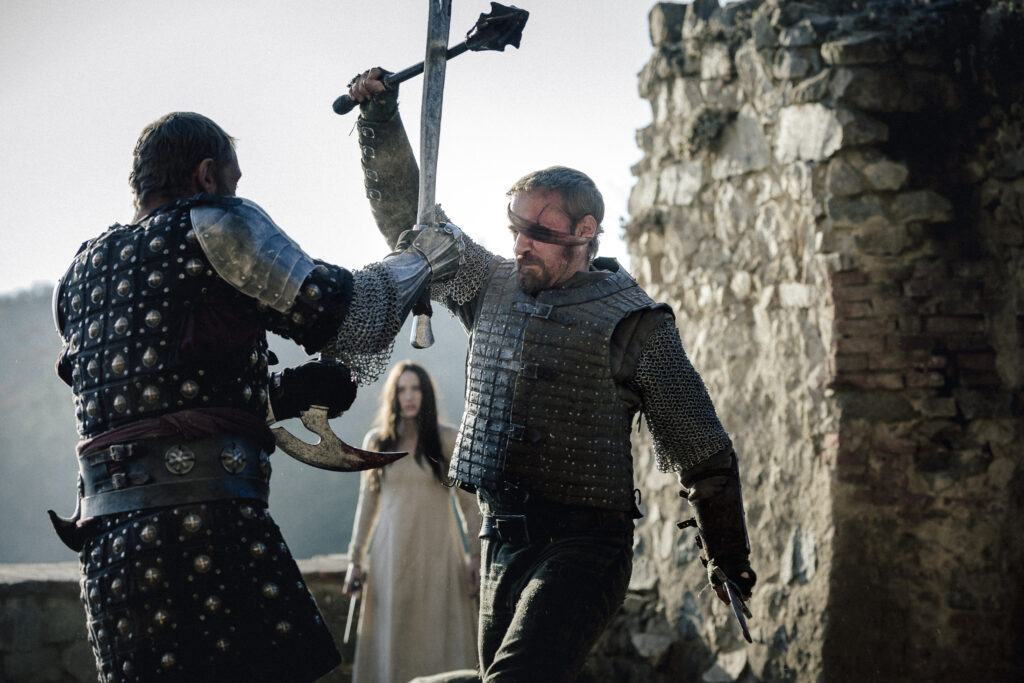March 25, 2023
by Carla Hay

Directed by Petr Jákl
Culture Representation: Taking place in the early 1420s, in the parts of Europe that are now known as the Czech Republic and Hungary, the action film “Medieval” (inspired by real historical events) features a predominantly white cast of characters (with a few black people) representing the working-class, middle-class and royalty.
Culture Clash: Czech mercenary leader Jan Žižka is hired to kidnap the fiancée of a lord, as part of a power struggle between two kings over who will take control of the Roman Empire.
Culture Audience: “Medieval” will appeal primarily to people who are interested in watching medieval war movies, no matter how poorly made and dull the movies might be.

Any movie that calls itself “Medieval,” with the story taking place in medieval Europe, fails to have any credibility when the lead character has an American accent. It’s just one of many problems in this mindless and boring action film. “Medieval” is never truly convincing as a medieval war movie. It just looks like a bunch of cast members playing medival dress-up with lackluster acting and cringeworthy dialogue, much of which looks and sounds too modern for a movie that is supposed to take place in the early 1420s.
Written and directed by Petr Jákl, “Medieval” has too much of a plodding pace and formulaic style to be considered immersive or thrilling. And since the movie is based on true events and real people, that makes it even more disappointing that “Medieval” looks very fake and mishandles too many of the historical aspects of the story that “Medieval” should have gotten right. “Medieval” also has a self-important tone that’s off-putting for a movie this badly made.
Ben Foster (who is American in real life) keeps his American accent is portrayal of Czech mercenary leader Jan Žižka, the movie’s protagonist. Apparently, it was just too hard for the “Medieval” filmmakers to have the lead actor speak with a Czech accent or even a vaguely Central European accent. It’s an example of the lazy filmmaking that pollutes this movie.
Filmmakers can spend a large percentage of a a movie’s budget on production design, costume design and action scenes, but if the overall story isn’t very good, then those visuals are just superficial distractions. Some viewers won’t care about the story and just want to see a movie like “Medieval” for the fight scenes. But even in that aspect, “Medieval” is not impressive at all.
“Medieval” begins by showing the family feud between half-brothers King Wenceslas of Czech (played by Karel Roden) and King Sigismund of Hungary (played by Matthew Goode), who are battling each other for control of the Roman Empire, after the death of Roman Emperor Charles IV. King Wenceslas is Charles IV’s first son, but he can only be crowned emperor by the Pope. King Sigismund wants the same thing. French supporters of the Pope are opposed to King Wenceslas becoming emperor.
Meanwhile, Jan (who works with a tight-knit group of about six men) is seen in battle with his men when they successfully thwart the assassination of Lord Boresh (played by Michael Caine) while he is traveling by carriage. Jan and his team are reluctant “bodyguards” because Lord Boresh has been slow to pay them. Lord Boresh asks haughtily, “When have you not been paid by me?” Giovanni (played by David Bowles), one of the soldiers in Jan’s mercenary gang, responds: “When have you not been protected by us?”
Lord Boresh does not want King Sigismund to become the emperor of the Roman Empire because he thinks this Hungarian king is too corrupt. Lord Boresh then gives Jan a new assignment: kidnap Lady Katherine (played by Sophie Lowe), who is the fiancée of Lord Rosenberg (played by Til Schweiger), a powerful ally of King Sigismund. The plan is that this kidnapping will distract Lord Rosenberg from being fully available and helpful to King Sigismund.
It’s a flimsy plan at best, but the entire movie revolves around it and brings nothing interesting to the story. And the most cliché of cliché things happens when there’s a “damsel in distress” in in a war movie. The “hero” falls in love with her. Foster and Lowe have as much chemistry together as soggy and corroded batteries. Meanwhile, Lady Katherine is treated like a pawn who’s tossed back and forth between her captors.
Jan’s main antagonists are King Sigismund’s army leader Torak (played by Roland Møller) and Captain Martin (played by Kevin Bernhardt), who goes after Jan’s family, thereby that changing Jan’s agenda from being a mercenary for hire to a family member who’s out for personal revenge. Jan’s family members who get dragged into this mess are his brother Jaroslav (played by William Moseley), Jaroslav’s wife Maria (played by Aneta Kernová), and their son/Jan’s nephew (played by William Lizr), who doesn’t have a name in the movie. Torak is also Jan’s former mentor.
Unfortunately, “Medieval” doesn’t do much with what could have been an intriguing story. It’s just a series of poorly staged action scenes in between monotonous conversations. Here’s an example of the terrible lines of dialogue in the movie. During a battle scene, Jan shouts to an opponent: “If you choose to fight, you may die! But for your cause, and that is a good death!” Just in case anyone watching “Medieval” forgot why people go to war.
History enthusiasts who are sticklers for details will be not be able to overlook the inaccurate nationality accents from the “Medieval” cast members. Jan and his family members have American accents. Most of the British actors sound British. It’s as if the “Medieval” filmmakers didn’t care that this movie is supposed to take place in Central Europe. And if anyone has the patience to watch “Medieval” until the very end to see all of its substandard foolishness, then it’s obvious that the filmmakers didn’t care about making a high-quality movie.
The Avenue released “Medieval” in U.S. cinemas on September 9, 2022. The movie was released digital and VOD on October 25, 2022. “Medieval” was released on Blu-ray and DVD on December 6, 2022.




